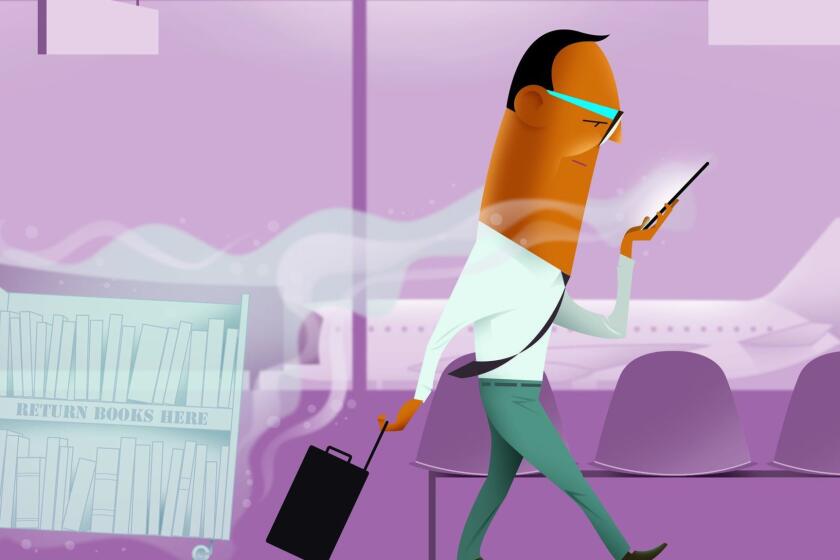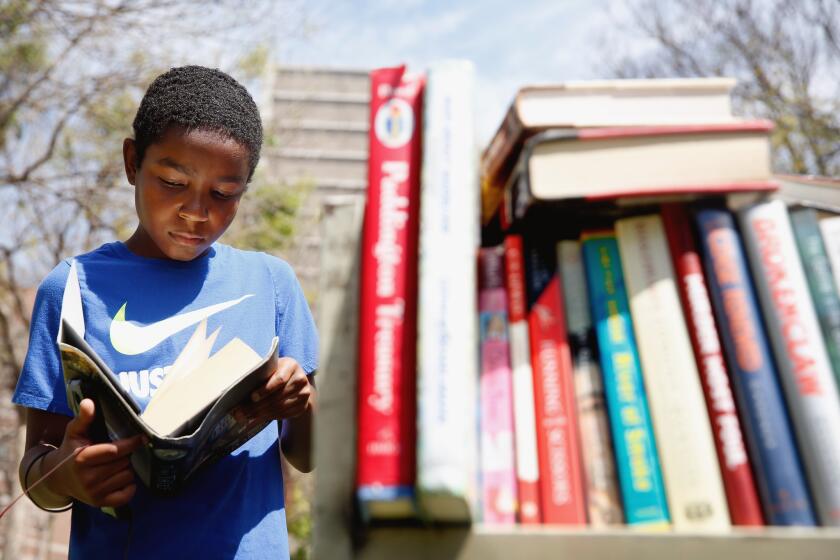Q&A: What do people ask a librarian in a pandemic? L.A. Library’s InfoNow has the answer

- Share via
For seven years librarian Tina Princenthal has fielded all manner of questions at the Los Angeles Public Library’s InfoNow desk. While the coronavirus pandemic has closed the landmark Central Library and all 72 branches for the foreseeable future, InfoNow remains open and fully staffed – albeit with a shift in approach.
Once drawing an eclectic variety of requests by phone, Princenthal and her colleagues have shifted to a more digital focus while still assisting those in great need who may have limited internet access.
City librarians now work from home answering dozens of emails a day. They aim to guide Los Angeles toward remaining connected to the library both as a vital source of information and a familiar resource that can provide comfort or distraction in an uncertain time.
“All of a sudden the world has changed so dramatically,” Princenthal said. “A lot of the questions we were getting were ‘How do I return this book?’ But more so they were about ‘How do I maintain a sense of normalcy when the world feels so out of control?’
“‘How can I find the things that comfort me when I can’t do the usual routine?’ And people didn’t say that, but you could hear in their voice. They were like, ‘Well, what do I do now?’”
In a recent phone interview, Princenthal talked about the dramatic ways her job has changed in recent weeks and how residents still can get access to books, music, movies and other information through lapl.org.
Are you seeing more action right now?
Well, we’re seeing a different kind of action because essentially all of our circulation of physical items has stopped. We don’t want people to return their books. We want them to stay home with their books, not worry about overdues, not worry about hold notifications.
Then the questions started pouring in on, “Is there a way for me to watch story time online? How do I access my library card number?” And so we’ve just been helping people adapt to gathering library resources in a digital way.
Angelica Gonzalez used to read about a book a year.
I imagine everything got a little less quirky and more grounded?
It got very bare bones very quick. Now we’re seeing like a wave of transitional questions. We’re getting questions from teachers who are like, “How can I adapt my classroom into a digital age?” Because all of these teachers suddenly were thrown into, “Do what you do in the classroom, but online.” And of course that’s not as simple said as done for these teachers.
For my department it’s been very important that we’re able to really listen to people and reassure them that the things that they’re familiar with at the library, like having access to books, are available now in the form of ebooks, and the things that they’re used to like coming into the library to read the newspaper, they can now do that through their computer.
Are you getting a lot more emails right now?
Usually, among the three of us ... we get into the library in the morning, there’s 17 emails for the day and we divide them up and answer them. We used to answer emails over the course of the morning. Now, we’re looking at well over 70 emails a day, and we’re answering those as fast as we can. And the other thing I want to mention, like kudos to the city of Los Angeles, is that people have been so kind via email. People have been so patient, we’ve gotten more thank-yous than we’ve ever gotten before. And that just sort of boosts us up; it gets us ready to answer more emails.
The Los Angeles Times Book Club is reading “The Library Book” by Susan Orlean. Here’s an excerpt.
Information has moved so quickly with regard to COVID-19, do you end up fielding questions about that as well?
We haven’t. We get questions, but it’s more like, “Where can I find resources on COVID?” We try to refer people, rather than writing back and saying, “Yeah, this is what you should be doing from me, a librarian.” We try to empower people to find resources that they can trust and that they can use. Because my philosophy, and I think a lot of librarians share this, is that one question is never enough. You’re always going to have more questions and that’s a good thing. That means that you’re learning and you’re interested.
In terms of what people are accessing, have you noticed people gravitating toward pandemic reading? Whether fiction or otherwise?
I can’t say that I have because people are accessing these items through e-media and so I can’t see what they’re checking out in the same way as in the physical library I can say, “Hey, we used to have these books on the shelf and now that’s an empty space.”
Certainly there’s been a lot more interest around topics like gardening and cooking and activities for kids, things that we maybe didn’t have enough time to focus on before, suddenly everybody’s very interested. I went and grabbed a book on cocktail making and tea making and gardening so I’d have stuff to read. I got a definitive guide to self-care because I thought that would be helpful at home during this time.
What I’m noticing a lot of through email is that patrons are really eager to gain access to Kanopy, Hoopla and OverDrive, which all provide access to streaming movies [and] streaming TV services. People are looking for a different variety of film content than they just have at home.
Have there been any questions that have come through that have surprised you?
We haven’t gotten as many odd questions as you might imagine. I feel like people are still sort of in emergency mode. I got an email from a woman who introduced herself as being from another state and she was asking about our e-media resources, but she said she wasn’t planning on accessing them. She just wanted to know what we had. And I thought that was really unusual.
So I wrote her back and I said, “Well, this is what we have online. This is what we’re making available to the public,” sort of like expecting her to write back and be like, “I’m from the state, but I want your library card,” because we get a ton of that. And she wrote back and she said, “That’s so fantastic. I’m walking my parents through all of this over the phone. And so I needed a librarian to tell me so I could have my parents in Los Angeles access all these resources.”
In a virtual meet-up, “Almost Home” author Fanny Singer and mother and famed chef Alice Waters join book club readers April 21 for a kitchen conversation.
With such a greater emphasis on digital, I imagine that’s had an effect on how you do your job as well?
It’s very different. When it’s over the phone, it’s really easy to do what I call putting a smile in your voice. People hear you and they know your tone and they know that you’re listening and you care. Through email, we’re putting in an extra effort to make sure that people know we are live people, not robots automatically responding to your emails.
And I mean it’s nice when we get questions. We got questions from a mom who wanted recommendations for her kids. And that’s so typical of when you work in libraries and you have a mother that comes in and she’s like, “I have a third-grader and a fifth-grader. He likes robots, she likes fairies. What do you got?”
I mean, we miss the library as much as the public does, and we love getting these questions that we’re used to. It’s comforting to us to be able to answer these questions.
Ask a librarian: The InfoDesk is online at lapl.org/about-lapl/contact-us/infonow-e-mail-information-service.
More to Read
Sign up for our Book Club newsletter
Get the latest news, events and more from the Los Angeles Times Book Club, and help us get L.A. reading and talking.
You may occasionally receive promotional content from the Los Angeles Times.










